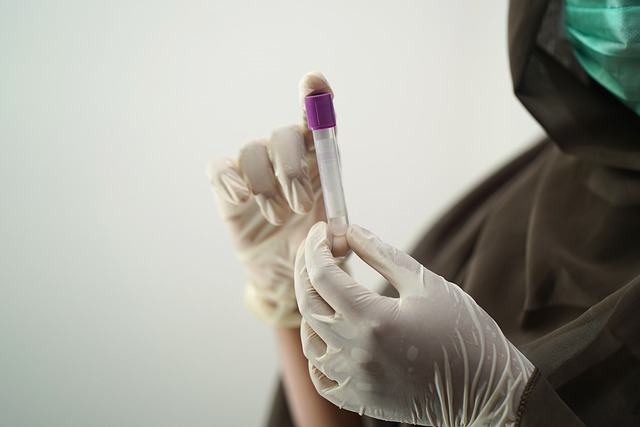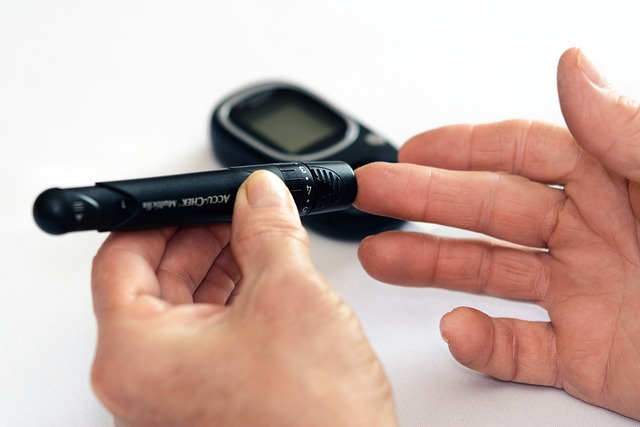The introduction of home blood testing kits in the UK has revolutionized personal healthcare management by allowing individuals to conveniently and privately monitor health markers such as glucose levels, cholesterol, kidney function, and liver function from home. These kits are designed for ease of use with user-friendly lancets, test strips, and clear instructions, providing immediate results that can be shared with healthcare providers for professional analysis. This service not only enhances patient convenience but also relieves strain on the NHS by cutting down on routine clinic visits. The UK's adoption of at-home blood testing reflects a commitment to integrating technology into healthcare delivery, catering to contemporary lifestyles and promoting proactive health management. For those interested in self-administered blood tests in the UK, it's important to follow instructions precisely to ensure accurate results, with options for immediate at-home analysis or mailing test strips to a lab. While home testing is convenient, results should be interpreted with care and used as a supplement to professional medical advice, especially when it comes to parameters like thyroid function that require medical expertise for accurate interpretation. Any abnormal results or concerning symptoms necessitate prompt consultation with a healthcare provider for further evaluation and treatment.
home blood testing, self-administered blood tests, interpreting results, professional consultation, UK health checks
In an era where health awareness and proactive care are paramount, the convenience of conducting health checks at home has never been more relevant. The UK’s embrace of at-home blood tests empowers individuals to monitor their wellbeing from the comfort of their abode. This article delves into the significance of these tests within the UK context, offering a comprehensive guide to self-administered blood testing and the nuances of result interpretation. Understanding when to seek professional advice is also crucial for accurate diagnosis and effective management of health conditions. Join us as we explore this critical aspect of home healthcare, ensuring that you are well-equipped with knowledge and resources for your health journey.
- Understanding the Importance of Home Blood Testing in the UK
- Step-by-Step Guide to Self-Administered Blood Tests at Home
- Interpreting Your Home Blood Test Results and When to Consult a Professional
Understanding the Importance of Home Blood Testing in the UK

In the UK, the convenience and accessibility of home blood testing have made it a pivotal aspect of personal healthcare management. With the advent of advanced medical technology, individuals can now monitor their health indicators, such as glucose levels, cholesterol, kidney function, and liver function, from the comfort of their own homes. This approach to healthcare is particularly beneficial for those with busy schedules or limited mobility who might struggle to attend clinic appointments. The home blood testing kits available in the UK are designed with user-friendliness in mind, often including lancets, test strips, and instructions that guide users through the process. These tests provide immediate results, which can then be shared with healthcare providers for professional interpretation and advice. This empowers individuals to take an active role in their health monitoring, leading to early detection of potential issues and timely interventions, which is crucial for managing chronic conditions or preventing acute health crises. The blood test at home UK service not only enhances convenience but also contributes to the reduction of strain on NHS resources by minimising the number of routine clinic visits required. As such, it embodies a commendable integration of technology and healthcare that aligns with modern lifestyle demands and the need for efficient medical services.
Step-by-Step Guide to Self-Administered Blood Tests at Home

For individuals seeking the convenience and privacy of conducting a blood test from the comfort of their own home in the UK, self-administered blood tests have become an increasingly popular option. This step-by-step guide is designed to help you navigate the process safely and efficiently. The process begins with obtaining a kit from a reputable provider authorised to offer at-home testing services within the UK. These kits come with comprehensive instructions, all necessary materials, and a lancet for skin puncture, as well as sterile lancets for sample collection. It’s crucial to follow these instructions meticulously; they detail how to prepare the area where you will perform the test, how to carry out the blood draw, and how to correctly apply the sample to the testing device.
Once you have collected your blood sample by gently pricking your fingertip with the lancet provided, you’ll need to apply it to the test strip. After a few seconds, you can insert the strip into the accompanying machine or mail it to a laboratory for professional analysis, depending on the kit type you’ve chosen. The machine will then provide immediate results for common health indicators such as glucose levels, cholesterol, kidney and liver function, and more. For tests requiring lab analysis, simply follow the provided return protocol to ensure your sample reaches the laboratory for processing. Results from these at-home blood tests can offer valuable insights into your health status and, if abnormal, may prompt a follow-up with a healthcare professional. This empowers individuals to take an active role in their health management, all from the convenience of their home in the UK.
Interpreting Your Home Blood Test Results and When to Consult a Professional

Conducting a blood test at home in the UK offers a convenient and private way to monitor health indicators. Upon receiving your home blood test kit, following the provided instructions is crucial. After collecting the sample, the results will be available online or through a mobile app, depending on the service provider. Interpreting these results can be straightforward for some parameters like glucose levels or cholesterol, where normal ranges are well-established. However, understanding the implications of your blood test at home UK results for other markers may require medical expertise. For instance, thyroid function tests measure the levels of thyroid-stimulating hormone (TSH) and thyroxine (T4), which can affect metabolism and mood. While slight variations may be within the normal range, they could still indicate a potential health issue that warrants discussion with a healthcare professional.
It’s important to approach home blood test results with a balanced perspective. While these tests provide valuable insights into your health, they are not a substitute for regular medical check-ups or professional advice. If your home blood test at home UK results are outside the normal range and you notice symptoms or feel unwell, it’s advisable to consult a healthcare provider as soon as possible. A professional can offer guidance on whether the results reflect a true health concern, provide further testing if necessary, and recommend treatment options. Remember, persistent abnormalities should always be assessed by a medical expert to rule out underlying conditions or to confirm a diagnosis, ensuring you receive the appropriate care for your well-being.
In conclusion, home blood testing has become an invaluable tool for individuals in the UK, offering a convenient and private means to monitor health indicators. By following a clear step-by-step guide, one can safely conduct self-administered blood tests at home, paving the way for early detection of potential health issues. Interpreting these results requires careful consideration and professional advice when necessary, ensuring any abnormalities are addressed promptly. The rise of home blood testing underscores a shift towards patient empowerment in health management, emphasising the importance of staying informed about one’s health status from the comfort of one’s own home. For those interested in exploring the benefits of blood test at home UK services, understanding the process and knowing when to seek medical counsel is key to making informed decisions about their health care.
